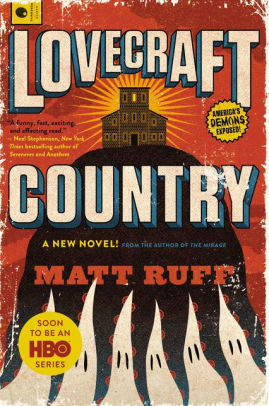Book Review: Lovecraft Country by Matt Ruff
Atticus Turner knows about dangerous people. They’re everywhere, though some locations have more concentration of danger than others. If you go traveling, you have to bring a special map to show the safest places to eat and sleep. Of course, between those places the dangerous people could ambush you at any time. And even if you’re in a “safe” place, the dangerous people could take it into their heads to attack anyway. The cops are no help, because the dangerous people have infiltrated the police and even to the highest level of the government. And that’s even before you count in the sorcerers.

That’s because Atticus is a black man in 1954, living in Jim Crow America. He may be a Korean War veteran, but that and a dime won’t even buy him a cup of coffee if he walks into the wrong diner. His uncle’s book, the Safe Negro Travel Guide (like the real-life Negro Motorist Green Book) gives some guidance, but it’s incomplete and needs constant updating. But Atticus is also a speculative fiction fan, who knows that there are alternative ways to think about things.
When Atticus’ father Montrose Turner summons him to Ardham, Massachusetts, at first Atticus mistakes it for the fictional town of Arkham, invented by H.P. Lovecraft. Not that Ardham is much better by comparison. It’s a backwoods community in a county run by a virulently racist sheriff that was founded by a religious cult. Why Montrose wants Atticus to come there, even if one of Atticus’ ancestors escaped from the place a couple of centuries ago, is a bit of a mystery.
It turns out that the Adamite Order of the Ancient Dawn, headed by the Braithwhite family, has an interest in using Atticus in a ritual to grant them great magical power, and they’re not too particular about what shape he’ll be in afterwards.
H.P. Lovecraft, as has been mentioned before, was racist to the point that other bigots would sometimes ask if he could tone it down a bit. This and his general xenophobia strongly influenced his tales of horror and dark fantasy. But translated into a cold universe of forces that did not care about human beings and often destroyed them in passing, the stories have themes that resonate. So the literary community still is influenced by the Cthulhu Mythos, even as it tries to critique and deconstruct the racism in them.
In this set of linked stories, the Turner, Berry and Dandridge families learn that while Lovecraft’s stories were fictional, they were based on real supernatural forces. Each long story has a different member of the families as the focus character as they deal with ghosts, curses and alien planets while the Order makes its plans and racism is still an ever present threat.
The writing is good, and I found the characterization interesting. Not all of our protagonists are necessarily good people, but they’re understandable. And while most of the antagonists are stock racist villains, Caleb Braithwhite honestly doesn’t seem to care about race at all and is a pleasant, generous man as long as he’s getting exactly what he wants.
Of the stories, I found “Jekyll in Hyde Park” to be the most intriguing, but just why falls into spoiler territory.
The ending ties things up nicely; while there could easily be many more stories with these characters, there’s no need for a direct sequel.
While things have in many ways improved in America since 1954, the book’s themes resonate with today, and especially this summer.
Content note: racism and racist language, including the N-word, racially-motivated violence. Off-screen extramarital sex.
Recommended to horror fans, senior high age on up.
There’s an HBO miniseries coming soon, executive produced by Jordan Peele:

